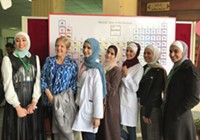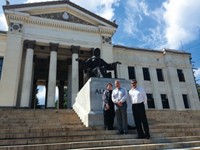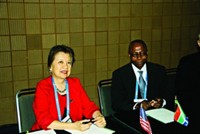Advertisement
Grab your lab coat. Let's get started
Welcome!
Welcome!
Create an account below to get 6 C&EN articles per month, receive newsletters and more - all free.
It seems this is your first time logging in online. Please enter the following information to continue.
As an ACS member you automatically get access to this site. All we need is few more details to create your reading experience.
Not you? Sign in with a different account.
Not you? Sign in with a different account.
ERROR 1
ERROR 1
ERROR 2
ERROR 2
ERROR 2
ERROR 2
ERROR 2
Password and Confirm password must match.
If you have an ACS member number, please enter it here so we can link this account to your membership. (optional)
ERROR 2
ACS values your privacy. By submitting your information, you are gaining access to C&EN and subscribing to our weekly newsletter. We use the information you provide to make your reading experience better, and we will never sell your data to third party members.
Environment
Bangkok Hosts Asian Chemical Congress
International: Meeting draws some 1,800 attendees in Bangkok
September 7, 2011

The Federation of Asian Chemical Societies (FACS) kicked off the 14th Asian Chemical Congress yesterday in Bangkok. The conference will run through Thursday at the Queen Sirikit National Convention Center.
Organizers expect participation to reach 1,800 speakers, exhibitors, and delegates from 43 countries who will have a choice of five workshops, eight general sessions, and 23 symposia built around the theme of “Contemporary Chemistry for Sustainability and Economic Sufficiency.” The theme reflects the key role of the chemical sciences in addressing global environmental, health, and energy challenges, said Supawan Tantayanon, chair of the organizing committee and president of FACS. She added that the congress gains special significance because it’s occurring during the International Year of Chemistry.
Attendees were disappointed that Thailand’s Princess Chulabhorn, a Ph.D. chemist and patron of the Chemical Society of Thailand, was unable to preside over the opening ceremonies as planned.
“Chemistry in Asia is a vibrant mixture of truly established powerhouses of chemistry together with countries and regions in which chemical enterprise activity is more recently emerging and developing,” noted David Black, secretary-general of the International Union of Pure & Applied Chemistry, in his remarks at the opening ceremony. “Some other parts of the world are struggling to appreciate the continuing value of education and research in the hard sciences,” Black continued, whereas “countries in the Asian region see scientific activity as providing the key to their material future. Consequently, an Asian chemical congress is always a great source of innovation and of innovative, exciting, and enthusiastic science.”
Also yesterday, FACS admitted the Cambodian Chemical Society to the federation and completed the signing of a memorandum of agreement with the American Chemical Society for a three-year collaboration.
The Cambodian Chemical Society is just over a year old and has about 100 members, according to Chek Sotha, the society’s president. “We lack instruments, we lack funding,” she told C&EN. By being part of FACS, she added, “we hope to get support,” both material and intellectual.
The agreement between ACS and FACS “comes from a shared interest in engaging Asian/U.S. chemical communities in collaborations, research, education, and meetings in recognition of the need for chemists to address the challenges humanity faces,” ACS President Nancy Jackson told C&EN. “We are a global community of scientists who share the responsibility of addressing the critical issues confronting us all: energy, sustainability, clean water, food, and health, and it will take global collaboration to successfully meet these challenges.”





Join the conversation
Contact the reporter
Submit a Letter to the Editor for publication
Engage with us on Twitter